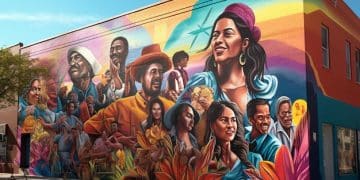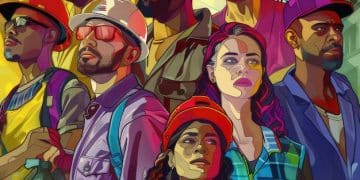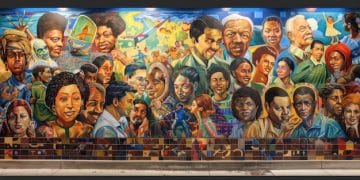Hip Hop and Politics: Advocating Social Justice Through Music
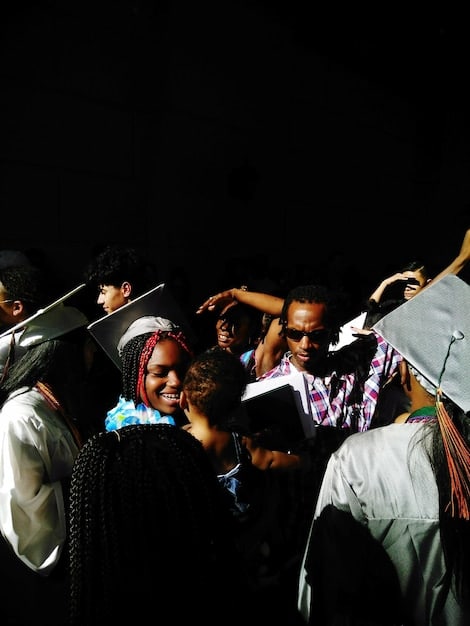
Through compelling narratives and unflinching critiques, hip hop artists consistently leverage their influential platforms to advocate for social justice, transforming music into a powerful vehicle for political and societal change.
In the dynamic landscape of music, few genres possess the raw power and unwavering commitment to social commentary found in hip hop. From its nascent stages in the Bronx to its global ubiquity, the genre has served as a potent microphone for the marginalized, a dynamic forum where artists voice the lived realities and systemic inequities often overlooked by mainstream discourse. This exploration delves into how Hip Hop and Politics: How Artists Are Using Their Music to Advocate for Social Justice, examining its enduring legacy and evolving methods of activism.
The Genesis of Political Consciousness in Hip Hop
Hip hop emerged from the crucible of urban despair, a creative response to socio-economic disenfranchisement and racial injustice in the late 1970s. Its foundational elements—DJing, MCing, breakdancing, and graffiti art—were not merely forms of entertainment but integral components of a burgeoning cultural movement that provided identity and voice to communities often rendered invisible.
Early pioneers recognized the microphone’s potential as a tool for public address, transforming party anthems into powerful political statements. This shift from celebratory escapism to critical engagement marked a significant turning point, laying the groundwork for hip hop to become a formidable force in social justice advocacy.
Early Voices and Their Impact
The transition from celebratory party tracks to socio-political commentary wasn’t immediate, but it was profoundly influential. Artists began to articulate the struggles of their communities, addressing topics like police brutality, poverty, and institutional racism. These early artistic endorsements of political themes demonstrated hip hop’s immense potential to catalyze dialogue and action.
- Grandmaster Flash & The Furious Five’s “The Message” illustrated urban decay and its human cost.
- Public Enemy redefined confrontational political rap, with Chuck D proclaiming hip hop as the “Black CNN.”
- KRS-One and Boogie Down Productions championed education and anti-violence messages, often directly challenging systemic issues.
Their groundbreaking work provided an urgent, unfiltered look into conditions that mainstream media often ignored. This raw honesty resonated deeply with listeners, sparking conversations and inspiring a generation of artists to embrace their role as social commentators.
The late 1980s and early 1990s consolidated hip hop’s role as a vital platform for political expression. The music evolved beyond simple protest, embedding complex analyses of power structures, economic disparities, and the criminal justice system within its lyrical tapestry. This deep engagement ensured that the genre remained inextricably linked to movements for social change.
Challenging Systemic Injustice Through Lyrics
One of hip hop’s most enduring strengths lies in its uncanny ability to dissect and challenge systemic injustices through potent lyrical storytelling. Artists frequently employ vivid imagery, direct confrontation, and personal narratives to expose issues ranging from racial profiling to economic disenfranchisement, thereby educating and galvanizing their listenership.
This lyrical activism often serves as an informal journalism, offering perspectives and facts that are frequently absent from traditional media outlets. By presenting these harsh realities, hip hop artists compel listeners to confront uncomfortable truths about society and its often-unequal structures.
Police Brutality and Racial Inequality
The issue of police brutality and racial inequality has been a central theme in hip hop since its inception. Artists like N.W.A. with their seismic hit “F*** tha Police” articulated the rage and frustration experienced by communities subjected to systemic harassment and violence. This wasn’t merely entertainment; it was a visceral cry for justice that resonated globally.
- Tupac Shakur’s “Changes” addressed police brutality, poverty, and racial discrimination, advocating for societal empathy.
- Kendrick Lamar’s “Alright” became an anthem for the Black Lives Matter movement, embodying resilience in the face of oppression.
- Artists like J. Cole and Common have also consistently used their platforms to shed light on racial injustices and advocate for policy changes.
These songs not only document the struggle but also serve as powerful tools for solidarity, uniting listeners in shared experiences and collective calls for reform. The music transcends mere artistic expression, becoming a vital component of the ongoing fight for civil rights.
Beyond direct denunciations, hip hop lyrics often delve into the psychological toll of living under systemic oppression. They explore the nuances of community resilience, the complexities of identity, and the enduring hope for a more equitable future. This comprehensive approach ensures that the message is both impactful and deeply human.
Empowering Communities: Beyond the Microphone
The influence of hip hop artists on social justice extends far beyond recorded tracks and concert stages. Many have strategically utilized their fame and financial resources to establish foundations, fund initiatives, and directly support grassroots movements, transforming their art into actionable change within communities.
This commitment to tangible impact underscores a deep responsibility felt by many artists to give back to the communities that shaped them. Their efforts often address the root causes of systemic issues, providing resources and opportunities where they are most needed.
Philanthropic Endeavors and Community Programs
Numerous hip hop artists have channeled their success into significant philanthropic efforts. These initiatives often focus on education, economic empowerment, voting rights, and criminal justice reform, demonstrating a holistic approach to community upliftment.
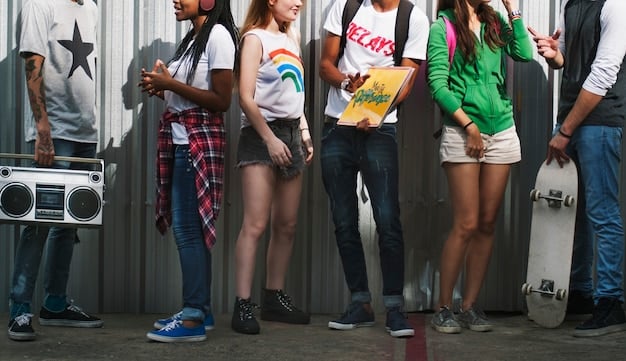
- Jay-Z’s Shawn Carter Foundation provides scholarships and educational opportunities for underserved youth.
- Killer Mike’s advocacy for financial literacy and Black-owned businesses extends his lyrical themes into real-world action.
- Chance the Rapper has consistently invested in Chicago Public Schools, using his platform to demand equitable funding.
These artists aren’t just writing checks; they’re actively involved in designing and implementing programs that foster long-term change. Their involvement lends credibility and visibility to causes that might otherwise remain overlooked, amplifying their impact significantly.
The power of their celebrity allows them to convene diverse stakeholders, from policymakers to community organizers, facilitating crucial dialogues and collaborations. This direct engagement ensures that their advocacy is both impactful and responsive to the needs of the people they serve, moving beyond superficial gestures to deliver concrete results.
Navigating Controversy and Maintaining Authenticity
The intersection of hip hop and politics is inherently complex, often placing artists at the center of controversy. Their role as outspoken critics of the status quo can lead to backlash from political figures, media scrutiny, and even commercial repercussions. Yet, for many, maintaining authenticity and speaking truth to power remains paramount.
Artists must navigate a delicate balance between artistic freedom, commercial viability, and the imperative to represent their communities truthfully. This often involves resisting pressure to dilute their messages or conform to mainstream expectations, preserving the integrity of their activism.
The Price of Protest and Artistic Integrity
From the early days, artists have faced significant challenges. N.W.A. faced FBI scrutiny, and Public Enemy was often vilified for its confrontational stance. More recently, artists engaging in political protest have experienced boycotts, loss of endorsements, and public smear campaigns. Despite these risks, many choose to stand firm.
- Kanye West’s controversial political statements, while polarizing, underscore the artist’s right to express unconventional views.
- Colin Kaepernick’s silent protest, supported by many in the hip hop community, highlighted the intersection of sports, music, and activism.
- The Dixie Chicks, though not hip hop, serve as a historical example of artists facing career repercussions for political speech, a lesson not lost on the music industry.
This unwavering dedication to their beliefs, even in the face of adversity, reinforces hip hop’s reputation as a genre unyielding in its commitment to social justice. It demonstrates that for many artists, the message outweighs commercial success, embodying a profound sense of responsibility.
Maintaining artistic authenticity in the face of commercial pressures is a constant struggle. Artists must decide whether to temper their message for wider appeal or remain uncompromising, often choosing the latter to uphold the genre’s legacy of fearless commentary. This choice reinforces their credibility and deepens their connection with an audience that values honesty.
Global Echoes: Hip Hop’s International Influence
While rooted deeply in the American experience, hip hop’s political resonance has transcended geographical boundaries, inspiring artists and activists globally. From the favelas of Brazil to the townships of South Africa, the genre has been adopted and adapted by diverse cultures, serving as a universal language for resistance and empowerment.
This global adoption demonstrates the universality of the struggles hip hop addresses—poverty, injustice, and systemic oppression—and the genre’s inherent flexibility to articulate these challenges within varied socio-political contexts. It underscores hip hop’s power as a truly global movement for social change.
International Artists and Local Struggles
Artists across continents have embraced hip hop as a medium to confront local issues, drawing parallels with the American experience while infusing their unique cultural narratives. This cross-pollination of ideas and strategies enriches the global discourse on human rights and justice.
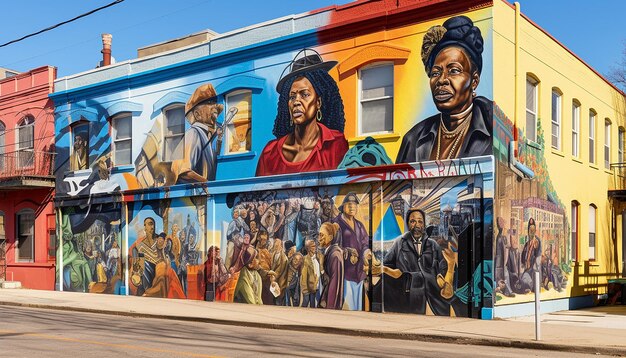
- K’naan, a Somali-Canadian artist, often addresses themes of war, displacement, and cultural identity in his music.
- Artists in France have used hip hop to articulate the immigrant experience and challenge racial discrimination.
- The rise of socially conscious hip hop in nations like South Africa reflects the enduring legacy of apartheid and calls for continued reform.
These artists not only amplify local voices but also connect disparate struggles, fostering a global solidarity network. Their music becomes a bridge, allowing communities worldwide to share strategies, find common ground, and collectively advocate for a more just world, transcending linguistic and cultural barriers.
The global reach of hip hop also means that issues discussed in one country can find resonance and generate empathy in others. This interconnectedness allows for greater pressure on oppressive regimes and encourages a more unified front against injustices wherever they occur. The genre effectively functions as a global town hall, fostering dialogue and collective action.
The Future of Hip Hop, Politics, and Advocacy
As hip hop continues to evolve, so too does its role in political advocacy. The digital age has democratized music distribution and amplified artists’ voices, allowing for direct engagement with audiences and unprecedented speed in disseminating messages. This technological shift promises to further solidify hip hop’s position as a vanguard of social change.
The future of hip hop activism will likely see even greater integration with digital tools, from viral campaigns to direct calls to action facilitated by social media. The genre remains uniquely positioned to adapt to new platforms while retaining its core commitment to empowering the dispossessed.
Digital Activism and New Platforms
The rise of social media and streaming platforms has provided artists with powerful new tools for advocacy. They can now directly engage with fans, organize events, and disseminate information without relying solely on traditional media gatekeepers. This direct line of communication is revolutionary for activism.
- Artists frequently use Instagram Live and Twitter to discuss current events, host conversations, and mobilize support for causes.
- Documentaries and short films produced by artists provide deeper dives into issues, often distributed via YouTube or streaming services.
- Crowdfunding and direct donation appeals allow artists to raise significant sums for relief efforts and social justice organizations.
This digital dexterity ensures that hip hop’s message remains relevant, dynamic, and responsive to immediate social and political needs. It enables rapid mobilization and fosters a more interactive relationship between artists and their politically engaged fanbase, ensuring the longevity and efficacy of their advocacy.
Moreover, the future will likely see more inter-genre collaborations and cross-cultural initiatives. As societal issues become increasingly global, artists from various backgrounds will find common ground in hip hop’s foundational themes, strengthening a worldwide movement for justice and equality. The genre’s adaptability and inclusive nature ensure its continued relevance as a catalyst for change.
Measuring Impact: From Rhymes to Real Change
Quantifying the precise impact of hip hop music on political outcomes can be challenging, but its influence is undeniable. From inspiring voter registration drives to shaping public discourse and influencing policy, the genre’s contribution to social justice movements is both profound and multifaceted. Its narratives often move beyond mere critique to offer blueprints for change.
The power of hip hop lies not just in its ability to inform, but to motivate. It fosters a sense of collective identity and shared purpose among listeners, translating artistic expression into practical engagement and, ultimately, real-world impact. This engagement is often measurable through increased civic participation.
Influence on Policy and Civic Engagement
While direct legislative change solely attributable to a song may be rare, hip hop’s cumulative effect on public opinion and political consciousness is significant. Through persistent advocacy, artists have brought previously marginalized issues into mainstream conversations, influencing policy debates both directly and indirectly.
- Increased voter registration among young people is often linked to artist-led campaigns and endorsements.
- The narratives presented by artists have contributed to shifting perceptions on issues like mass incarceration and police reform.
- Artists frequently participate in congressional hearings or advisory boards, lending their voices and experiences to policy development.
The cultural shifts initiated or amplified by hip hop permeate society, creating an environment where policy changes can become politically feasible. Its enduring presence in the cultural zeitgeist ensures that critical issues remain at the forefront of public consciousness, constantly pushing for greater accountability and justice.
The genre’s ability to simplify complex socio-political issues into digestible and emotionally resonant forms makes it a unique educational tool. By breaking down barriers to understanding, hip hop enables a wider audience to engage with and take action on matters that directly affect their lives and communities. This accessibility is a key factor in its sustained influence.
| Key Aspect | Brief Description |
|---|---|
| 🎤 Lyrical Activism | Artists use rhymes to challenge systemic injustices like police brutality and economic inequality. |
| 🌍 Global Influence | Hip hop transcends borders, inspiring social justice movements worldwide. |
| 🤝 Community Empowerment | Artists fund initiatives for education, economic opportunity, and policy change. |
| 💡 Navigating Controversy | Artists often face backlash but prioritize authenticity and truth-telling. |
Frequently Asked Questions
Hip hop emerged from economically disadvantaged communities in the Bronx during the 1970s. As artists began to process their lived experiences with poverty, racial discrimination, and police brutality, the music naturally evolved from party anthems into powerful commentary, providing a voice for the marginalized. This organic development solidified its role as a cultural and political force.
Numerous artists have significantly contributed to hip hop’s political landscape. Pioneers like Grandmaster Flash & The Furious Five, Public Enemy, and KRS-One laid the groundwork. More contemporary artists such as Kendrick Lamar, J. Cole, Common, and Killer Mike continue this legacy, consistently addressing social and political issues through their music and activism.
Many artists leverage their influence by establishing foundations, funding community programs, and engaging in direct advocacy. This includes providing scholarships, supporting economic empowerment initiatives, backing voter registration drives, and participating in discussions with policymakers to push for criminal justice reform and other systemic changes.
Artists often face significant backlash, including media criticism, political condemnation, and commercial repercussions. Maintaining artistic integrity while navigating these pressures is a constant struggle. However, many choose to uphold authenticity, viewing their art as a crucial platform for truth-telling, even when it means sacrificing mainstream acceptance or financial gain.
Absolutely. Hip hop’s themes of struggle, identity, and resistance have resonated globally, inspiring artists in diverse countries to address their unique local injustices. It has become a universal language for social commentary, fostering solidarity and encouraging dialogue across borders, amplifying calls for justice on a worldwide scale.
Conclusion
The journey of hip hop from the streets of the Bronx to a global phenomenon is intrinsically linked to its unwavering commitment to social justice. It is a genre that does not merely reflect society but actively seeks to reshape it, providing a platform for voices that might otherwise remain unheard. Through potent lyrics, community engagement, and unflinching authenticity, hip hop artists continue to advocate for a more equitable world, proving that music can indeed be a powerful catalyst for profound societal change. Their enduring legacy underscores the genre’s role not just as entertainment, but as a vital, evolving force in the global pursuit of justice.

